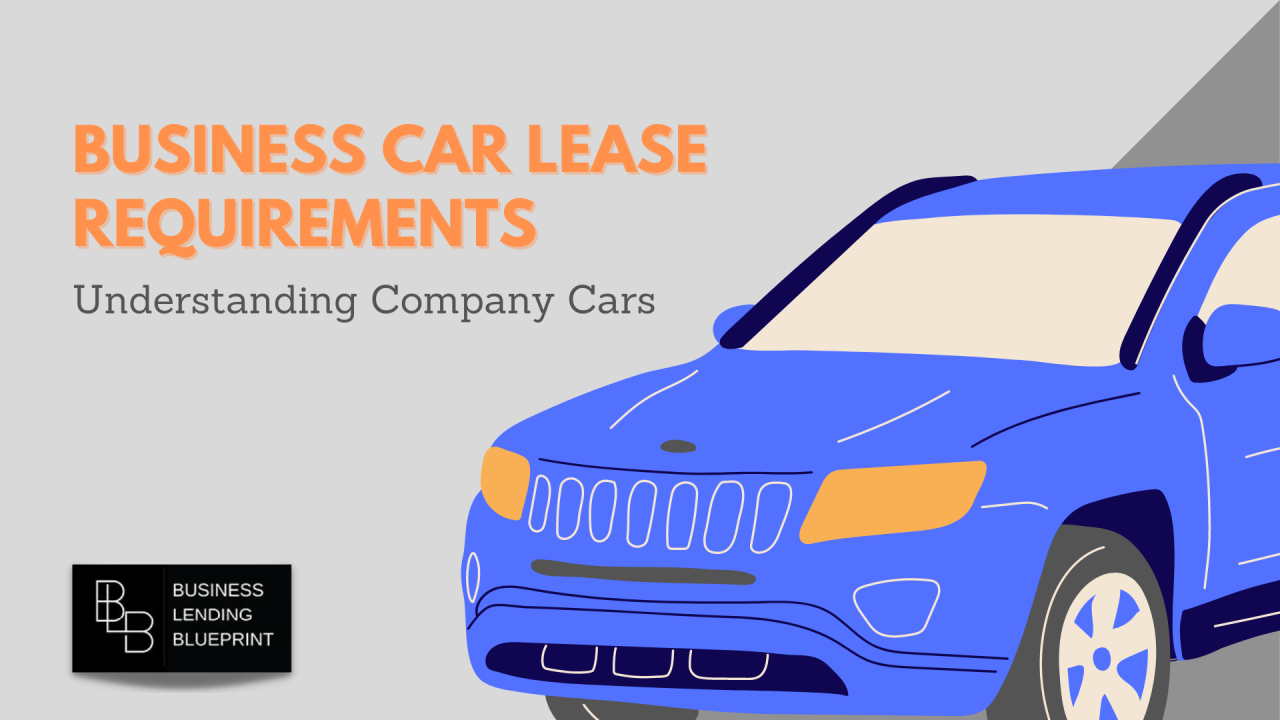Can my business lease a car? The answer is a resounding yes, but navigating the process requires understanding various factors. From eligibility requirements and cost considerations to the benefits of leasing versus buying, this guide will equip you with the knowledge to make an informed decision. We’ll explore different lease types, financing options, and strategies for negotiating favorable terms, ensuring you secure the best possible deal for your business.
This comprehensive guide delves into the specifics of business car leasing, covering everything from determining your eligibility based on your business structure (sole proprietorship, corporation, etc.) to understanding the tax implications and managing your lease effectively. We’ll provide clear explanations, helpful examples, and practical advice to simplify the often-complex world of business vehicle leasing.
Eligibility for Business Car Leasing

Securing a business car lease hinges on several factors, primarily revolving around the financial health and stability of your business. Lenders assess your creditworthiness, business history, and the overall risk involved in providing you with a vehicle lease. Understanding these requirements is crucial for a smooth application process.
Business Car Leasing Requirements
Generally, leasing companies require businesses to demonstrate financial stability and a good credit history. This often involves providing proof of income, business registration documents, and financial statements. The specific requirements can vary depending on the leasing company and the type of business. Larger corporations might face a more rigorous vetting process compared to sole proprietorships. However, all businesses should expect to provide evidence of their ability to meet the lease payments consistently.
Sole Proprietorship vs. Corporation Leasing Requirements
The documentation required for a sole proprietorship and a corporation will differ. A sole proprietorship, being a simpler business structure, might only need to provide personal credit reports and tax returns alongside business bank statements. Corporations, on the other hand, typically need to provide more extensive financial documentation, including corporate tax returns, audited financial statements, and potentially business credit reports. This is because corporations are legally separate entities from their owners, requiring a more thorough assessment of their financial standing.
Required Documentation for Business Lease Applications
Businesses should be prepared to submit a range of documents to support their lease application. This typically includes:
- Business registration documents (e.g., Articles of Incorporation, Certificate of Organization)
- Tax returns (corporate or personal, depending on the business structure)
- Bank statements (showing sufficient funds and consistent cash flow)
- Financial statements (balance sheets, income statements, cash flow statements, especially for corporations)
- Business credit report (if available)
- Personal credit report (for sole proprietorships and sometimes for corporations)
- Driver’s license and insurance information
The specific documents required can vary based on the lender’s policies and the complexity of the business.
Operating Lease vs. Finance Lease
Businesses have two primary financing options for leasing vehicles: operating leases and finance leases. Operating leases are essentially rentals, where the lessee pays for the use of the vehicle but doesn’t own it at the end of the lease term. Finance leases, conversely, transfer ownership of the vehicle to the lessee at the end of the lease term, often for a nominal fee. The choice between these options depends on the business’s financial goals and long-term plans.
Comparison of Business Car Lease Types
| Feature | Operating Lease | Finance Lease |
|---|---|---|
| Ownership at end of term | No | Yes (typically for a nominal fee) |
| Monthly payments | Generally lower | Generally higher |
| Tax implications | Lease payments are typically fully deductible as business expenses | Lease payments are partially deductible, with depreciation also being considered |
| Flexibility | More flexible, often with shorter terms | Less flexible, typically longer terms |
Cost Factors Involved in Business Car Leasing: Can My Business Lease A Car

Understanding the true cost of leasing a vehicle for your business is crucial for effective financial planning. Many factors influence monthly payments and overall expenditure, impacting your bottom line. This section details the key cost components to consider when evaluating a business car lease.
Typical Monthly Lease Payments
Monthly lease payments for business vehicles vary significantly depending on several factors. A compact car might range from $300 to $500 per month, while a larger SUV or van could cost $700 to $1200 or more. These figures are estimates and can be influenced by the vehicle’s make, model, year, and features. For instance, a well-equipped luxury sedan will command a higher monthly payment than a basic model of a similar size. The specific terms of the lease agreement also heavily influence the monthly cost.
Impact of Vehicle Type, Mileage Allowance, and Lease Term
The type of vehicle significantly impacts lease payments. Luxury vehicles and larger vehicles generally have higher lease payments due to their higher purchase price and depreciation rates. Mileage allowance directly affects cost; lower mileage allowances result in lower monthly payments but stricter usage limitations. Exceeding the allotted mileage often incurs substantial per-mile penalties. Lease term also plays a crucial role. Longer lease terms (e.g., 48 months) typically result in lower monthly payments, but you’ll pay more overall for the vehicle’s use. Shorter lease terms (e.g., 24 months) mean higher monthly payments but lower total cost.
Additional Fees Associated with Business Car Leasing
Beyond the monthly payment, several additional fees are common in business car leasing. A security deposit, often equivalent to one or two months’ rent, is typically required upfront to protect the leasing company against potential damages or non-payment. Excess mileage charges, as mentioned earlier, are levied for exceeding the agreed-upon mileage limit. Other potential fees include early termination fees (if you end the lease prematurely), administrative fees, and disposition fees (covering the cost of preparing the vehicle for resale at the end of the lease).
Sample Lease Agreement Highlighting Key Cost Components
Consider this hypothetical example: A business leases a mid-size sedan for 36 months with a monthly payment of $450. The security deposit is $900 (two months’ rent). The mileage allowance is 36,000 miles (1,000 miles per month). An excess mileage charge of $0.25 per mile applies beyond the limit. Early termination fees are equivalent to three months’ rent. The total cost over the lease term, excluding excess mileage charges, would be $16,200 ($450/month x 36 months) + $900 (security deposit). This illustrative example shows the significant cost elements beyond the monthly payment.
Potential Tax Implications for Businesses Leasing Vehicles
Leasing a vehicle for business purposes offers several tax advantages. Lease payments are typically deductible as business expenses, reducing your taxable income. However, the Internal Revenue Service (IRS) has specific rules and regulations regarding the deductibility of lease payments. Accurate record-keeping is crucial for claiming these deductions. It’s essential to consult with a tax professional to determine the precise tax implications of your specific lease agreement and business structure. Understanding these tax implications can significantly impact your overall cost.
Benefits of Leasing a Car for a Business
Leasing a vehicle for business purposes offers a compelling alternative to outright purchase, providing numerous financial and operational advantages that can significantly impact a company’s bottom line and overall efficiency. This section details the key benefits of business car leasing, focusing on practical applications and quantifiable advantages.
Improved Cash Flow Management
Leasing typically involves lower upfront costs compared to purchasing. Instead of a large capital outlay for a down payment and the full purchase price, businesses only need to pay a security deposit and monthly lease payments. This frees up valuable working capital that can be reinvested in other areas of the business, such as marketing, research and development, or hiring. For example, a small business owner might choose to lease a van for deliveries, avoiding a large initial investment and preserving cash for inventory purchases. This improved cash flow can be crucial for maintaining financial stability, especially during periods of economic uncertainty.
Maintaining a Newer Fleet, Can my business lease a car
Leasing allows businesses to regularly update their vehicles without the burden of reselling used assets. Lease terms typically range from 2 to 4 years, after which the vehicle can be returned and a newer model leased. This ensures a business always has access to reliable, modern vehicles with the latest safety features and technology. This is particularly beneficial for businesses relying on vehicles for transportation, such as delivery services or taxi companies, where vehicle reliability and a positive customer impression are paramount. A consistently modern fleet projects a professional image and minimizes downtime due to vehicle malfunctions.
Simplified Vehicle Maintenance and Repair
Many lease agreements include maintenance packages, simplifying the management of vehicle upkeep. These packages often cover routine servicing, repairs, and tire replacements, reducing administrative burdens and unexpected costs. This predictable maintenance expense simplifies budgeting and allows businesses to focus on core operations. For instance, a construction company leasing a fleet of trucks can rely on the maintenance package to minimize downtime due to mechanical issues, ensuring project continuity and efficiency. The contrast is stark when comparing this to the unpredictable and potentially substantial repair costs associated with owning a vehicle outright.
Total Cost of Ownership Comparison (5-Year Period)
A direct comparison of leasing versus purchasing over five years requires specific vehicle details and lease terms. However, a generalized example can illustrate the potential differences. Let’s consider a vehicle with a purchase price of $30,000. Assuming a 5-year loan at 5% interest, the total cost of ownership (including interest) would be significantly higher than leasing the same vehicle over the same period, even considering potential maintenance costs. The exact figures depend on depreciation, maintenance costs for both scenarios, and lease terms, but generally, leasing presents lower total costs due to reduced depreciation burden. A detailed financial analysis tailored to the specific business needs and chosen vehicle is always recommended.
Enhanced Company Image and Professional Appearance
Driving a well-maintained, modern vehicle can significantly enhance a company’s image and professional appearance. Leasing allows businesses to consistently present a polished image to clients and partners, fostering trust and credibility. For example, a consulting firm using leased luxury vehicles conveys professionalism and success to clients, contributing to a stronger brand perception. This positive perception can translate into improved business relationships and increased opportunities.
Finding and Choosing a Business Car Lease
Securing a suitable business car lease involves careful consideration of various factors, from identifying reliable providers to negotiating favorable terms and thoroughly reviewing the contract. A strategic approach ensures you obtain a lease that aligns with your business needs and budget.
Finding a reputable leasing provider is crucial for a smooth and beneficial experience. Several avenues exist for locating suitable options.
Reputable Sources for Business Car Leases
Dealerships, both franchised and independent, often offer leasing options alongside sales. Dealerships typically provide a wide selection of makes and models, often with various trim levels and packages. They can also offer on-site financing and potentially more flexible terms compared to some leasing companies. Leasing companies, on the other hand, specialize in leasing and may offer more competitive rates due to their volume and expertise. They typically have a wider range of vehicles available, including those not directly sold by dealerships. Online platforms and comparison websites can also be useful tools, allowing you to browse numerous offers from various dealerships and leasing companies simultaneously. These platforms often provide filtering options based on vehicle type, budget, and lease terms, streamlining your search process. Finally, working with a business finance broker can provide access to a broader range of leasing options and potentially better rates due to their established relationships with lenders.
Negotiating Favorable Lease Terms and Conditions
Effective negotiation is key to securing a favorable lease agreement. Before entering negotiations, thoroughly research market value and comparable lease offers. This allows you to confidently present your desired terms. Be prepared to discuss various aspects, such as the monthly payment, lease duration, mileage allowance, and any associated fees. Highlight your business’s creditworthiness and financial stability to strengthen your negotiating position. Consider exploring options such as residual value guarantees or early termination clauses to protect your business interests. A well-prepared negotiation strategy can significantly reduce your overall leasing costs. For instance, negotiating a lower monthly payment by extending the lease term might be beneficial if it aligns with your long-term business plans.
Reviewing the Fine Print of a Lease Agreement
Thorough review of the lease agreement is paramount. Don’t rush the process. Pay close attention to details such as the total lease cost, including all fees and charges. Carefully examine the mileage allowance, excess mileage charges, and any restrictions on vehicle usage. Understand the terms related to insurance, maintenance, and repairs. Clarify any ambiguous clauses with the leasing provider before signing the contract. Overlooking crucial details can lead to unexpected expenses or complications later. For example, a seemingly small difference in the mileage allowance can significantly impact your overall cost over the lease term. Similarly, understanding the implications of exceeding the mileage allowance is critical for budgeting.
Comparing Leasing Offers from Various Providers
Once you’ve gathered several leasing offers, compare them side-by-side. Use a spreadsheet or similar tool to organize the information. Focus on key aspects such as the monthly payment, total lease cost, mileage allowance, and any included services or warranties. Consider the reputation and financial stability of each provider. A lower monthly payment may not always translate to the best overall deal. Thorough comparison allows you to identify the offer that best suits your business’s needs and budget. For example, a slightly higher monthly payment with a more generous mileage allowance might be more cost-effective in the long run if your business requires extensive driving.
Checklist of Questions to Ask Before Signing a Business Car Lease
Before committing to a lease, a comprehensive checklist of questions ensures you understand all aspects of the agreement. These questions should cover the vehicle’s specifications, the lease terms, and the provider’s policies. For example, inquire about the vehicle’s warranty, maintenance requirements, and the process for handling repairs. Also, clarify the terms for early termination, excess mileage charges, and any other potential fees. A clear understanding of these aspects protects your business from unforeseen costs and complications. A sample question might be: “What is the process for addressing mechanical issues during the lease term, and what are my responsibilities regarding maintenance and repairs?”
Managing a Business Car Lease

Efficiently managing a business car lease is crucial for maximizing tax benefits, minimizing costs, and maintaining compliance. Proper record-keeping, adherence to maintenance schedules, and understanding lease agreement terms are essential for a smooth and profitable experience. Failure to do so can lead to unexpected expenses and potential legal complications.
Maintaining Accurate Records of Business Car Usage
Meticulous record-keeping is paramount for claiming legitimate business expenses related to your leased vehicle. The IRS requires detailed documentation to substantiate deductions. This includes not only mileage but also all expenses directly related to the vehicle’s operation for business purposes. Failure to maintain accurate records can result in disallowed deductions and potential audits.
Vehicle Maintenance and Repairs Under a Lease Agreement
Lease agreements typically Artikel responsibilities for vehicle maintenance and repairs. Understanding these stipulations is vital. Generally, routine maintenance like oil changes and tire rotations are the lessee’s responsibility, while major repairs due to manufacturing defects are usually covered by the manufacturer’s warranty. Keeping detailed records of all maintenance and repair work, including invoices and receipts, is crucial for resolving disputes and ensuring compliance with the lease agreement. For example, a record should include the date of service, description of work, cost, and the service provider’s contact information.
Mileage and Expense Tracking for Leased Vehicles
Tracking mileage and expenses associated with the leased vehicle is straightforward but requires consistency. A mileage log should meticulously record the date, starting and ending odometer readings, purpose of the trip (business or personal), and destination. Expenses, such as fuel, tolls, and parking fees, should be documented with receipts. Various apps and software are available to simplify this process, automatically calculating business mileage and categorizing expenses. For example, a driver could use a mileage tracking app to record daily business trips, automatically calculating the deductible mileage based on IRS guidelines. They could then link their expense tracking software to automatically categorize receipts and generate reports.
Implications of Breaching a Business Car Lease Agreement
Breaching a business car lease agreement can result in significant financial penalties and legal repercussions. Common breaches include exceeding mileage limits, failing to maintain the vehicle properly, or making unauthorized modifications. The consequences can range from early termination fees to legal action. For instance, exceeding the mileage limit by 10,000 miles might incur a penalty of several hundred dollars per mile. Therefore, understanding and adhering to all terms and conditions of the lease agreement is crucial.
Returning a Leased Vehicle at the End of the Lease Term
Returning a leased vehicle requires a systematic approach to ensure a smooth transition and avoid potential charges. This involves scheduling a return appointment with the leasing company, thoroughly cleaning the vehicle inside and out, and performing a pre-return inspection to identify and address any potential damage. Documentation of the vehicle’s condition before and after the return is crucial to avoid disputes regarding repair costs. For example, the lessee should take detailed photos of the vehicle’s exterior and interior before returning it, noting any existing damage. Following the leasing company’s prescribed procedures and maintaining detailed records throughout the process will help ensure a problem-free return.






